University Professional Skills Resit Portfolio (PRSK4048) Spring 2019
VerifiedAdded on 2023/04/07
|21
|4394
|255
Portfolio
AI Summary
This portfolio, submitted for the Spring 2019 Professional Skills Resit module (PRSK4048), assesses key professional skills through a series of tasks. Task 1 focuses on teamwork, incorporating a Belbin questionnaire for role identification and a written discussion reflecting on team experiences and the application of Belbin theory. Task 2 delves into professional ethics, requiring the creation of a code of conduct and an analysis of ethical dilemmas. Task 3 examines project management principles, covering planning, execution, and risk management. Task 4, the most extensive, requires students to demonstrate professional skills in action through a detailed analysis of a chosen scenario. The portfolio emphasizes self-reflection, analysis of strengths and weaknesses, and the application of theoretical frameworks to real-world situations, demonstrating a comprehensive understanding of professional competencies. The student explores their primary and secondary team roles as a coordinator and team worker, respectively.
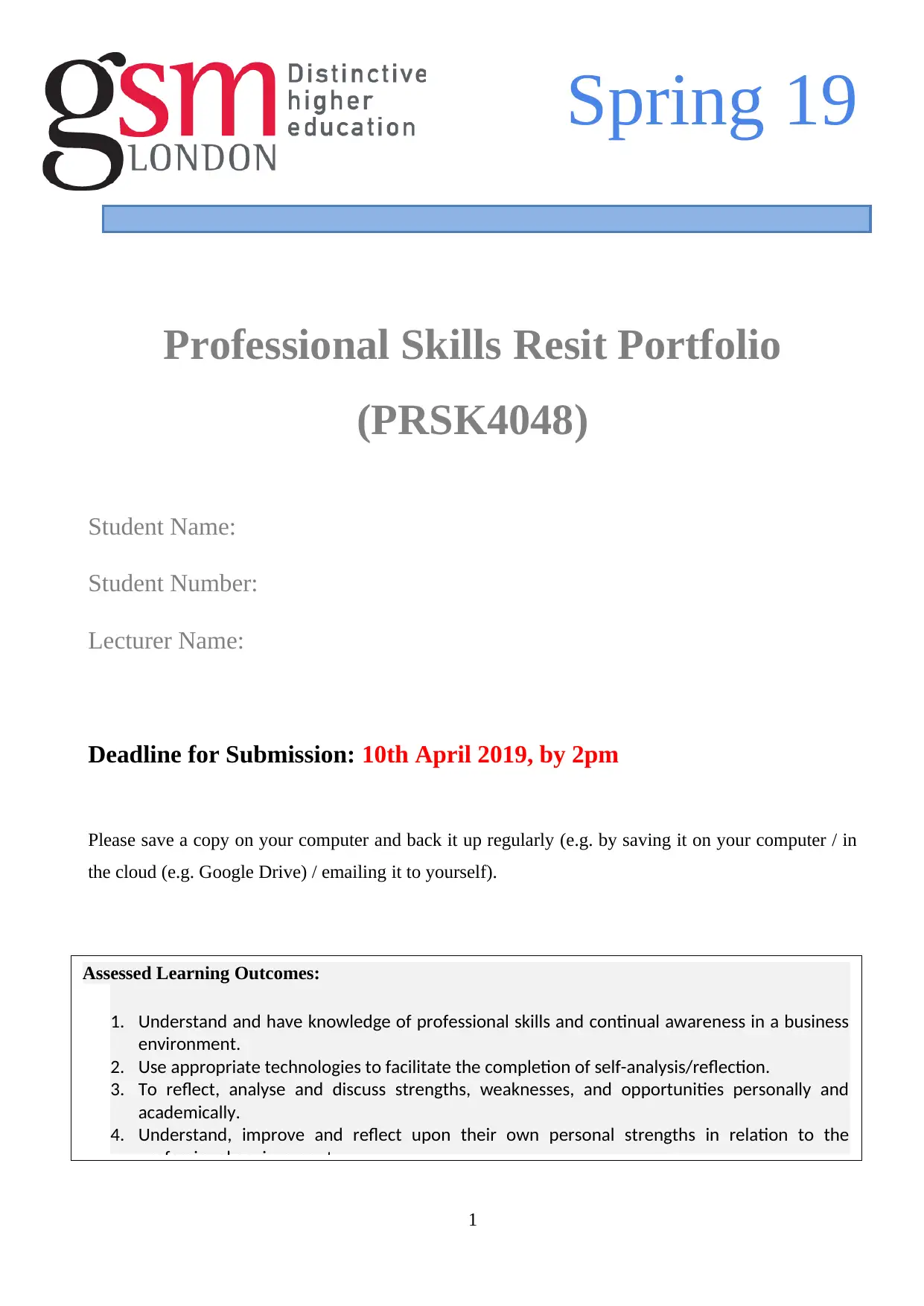
Spring 19
Professional Skills Resit Portfolio
(PRSK4048)
Student Name:
Student Number:
Lecturer Name:
Deadline for Submission: 10th April 2019, by 2pm
Please save a copy on your computer and back it up regularly (e.g. by saving it on your computer / in
the cloud (e.g. Google Drive) / emailing it to yourself).
1
Assessed Learning Outcomes:
1. Understand and have knowledge of professional skills and continual awareness in a business
environment.
2. Use appropriate technologies to facilitate the completion of self-analysis/reflection.
3. To reflect, analyse and discuss strengths, weaknesses, and opportunities personally and
academically.
4. Understand, improve and reflect upon their own personal strengths in relation to the
professional environment.
Professional Skills Resit Portfolio
(PRSK4048)
Student Name:
Student Number:
Lecturer Name:
Deadline for Submission: 10th April 2019, by 2pm
Please save a copy on your computer and back it up regularly (e.g. by saving it on your computer / in
the cloud (e.g. Google Drive) / emailing it to yourself).
1
Assessed Learning Outcomes:
1. Understand and have knowledge of professional skills and continual awareness in a business
environment.
2. Use appropriate technologies to facilitate the completion of self-analysis/reflection.
3. To reflect, analyse and discuss strengths, weaknesses, and opportunities personally and
academically.
4. Understand, improve and reflect upon their own personal strengths in relation to the
professional environment.
Paraphrase This Document
Need a fresh take? Get an instant paraphrase of this document with our AI Paraphraser

2
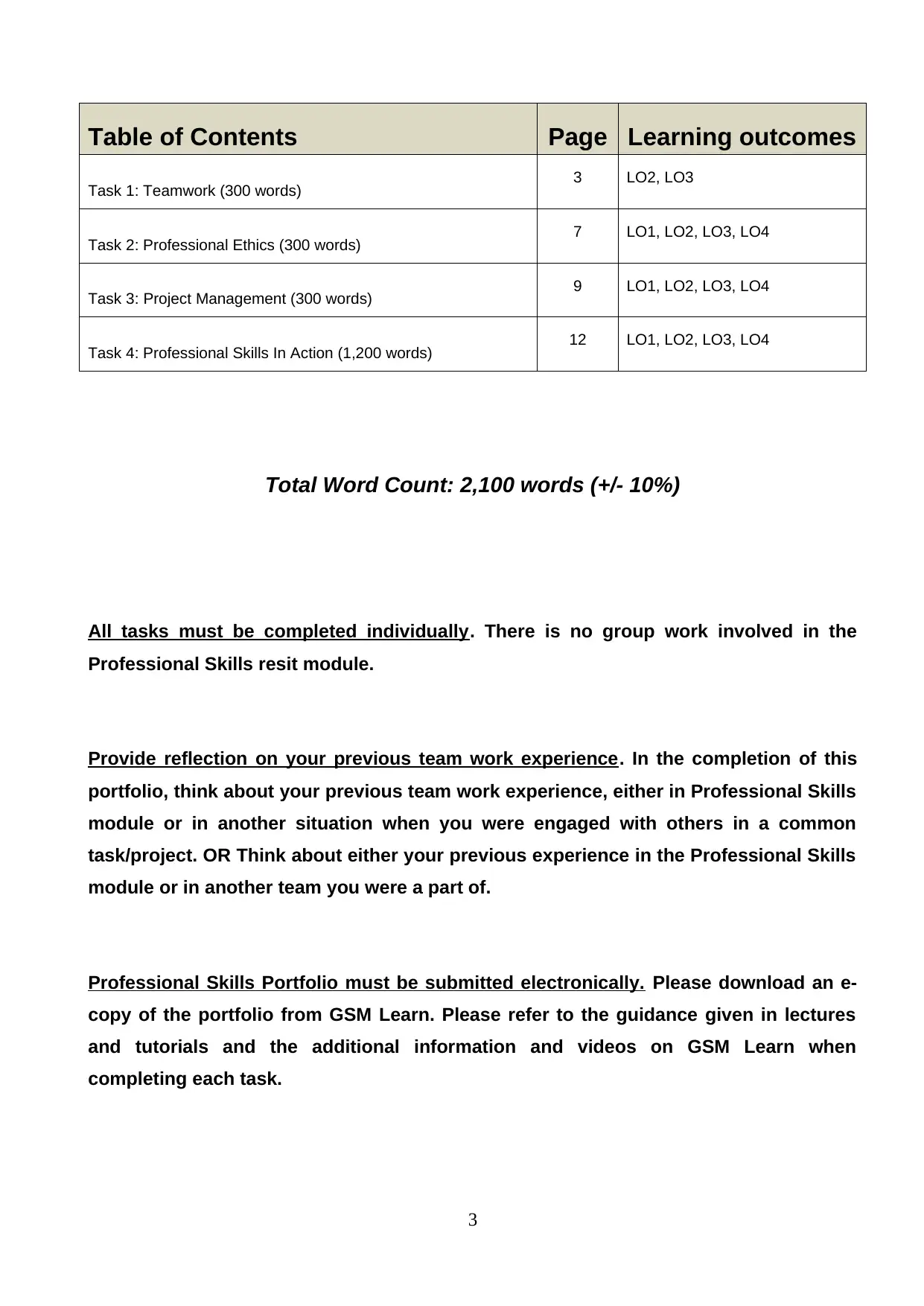
Table of Contents Page Learning outcomes
Task 1: Teamwork (300 words) 3 LO2, LO3
Task 2: Professional Ethics (300 words) 7 LO1, LO2, LO3, LO4
Task 3: Project Management (300 words) 9 LO1, LO2, LO3, LO4
Task 4: Professional Skills In Action (1,200 words) 12 LO1, LO2, LO3, LO4
Total Word Count: 2,100 words (+/- 10%)
All tasks must be completed individually. There is no group work involved in the
Professional Skills resit module.
Provide reflection on your previous team work experience. In the completion of this
portfolio, think about your previous team work experience, either in Professional Skills
module or in another situation when you were engaged with others in a common
task/project. OR Think about either your previous experience in the Professional Skills
module or in another team you were a part of.
Professional Skills Portfolio must be submitted electronically. Please download an e-
copy of the portfolio from GSM Learn. Please refer to the guidance given in lectures
and tutorials and the additional information and videos on GSM Learn when
completing each task.
3
Task 1: Teamwork (300 words) 3 LO2, LO3
Task 2: Professional Ethics (300 words) 7 LO1, LO2, LO3, LO4
Task 3: Project Management (300 words) 9 LO1, LO2, LO3, LO4
Task 4: Professional Skills In Action (1,200 words) 12 LO1, LO2, LO3, LO4
Total Word Count: 2,100 words (+/- 10%)
All tasks must be completed individually. There is no group work involved in the
Professional Skills resit module.
Provide reflection on your previous team work experience. In the completion of this
portfolio, think about your previous team work experience, either in Professional Skills
module or in another situation when you were engaged with others in a common
task/project. OR Think about either your previous experience in the Professional Skills
module or in another team you were a part of.
Professional Skills Portfolio must be submitted electronically. Please download an e-
copy of the portfolio from GSM Learn. Please refer to the guidance given in lectures
and tutorials and the additional information and videos on GSM Learn when
completing each task.
3
⊘ This is a preview!⊘
Do you want full access?
Subscribe today to unlock all pages.

Trusted by 1+ million students worldwide

4
Paraphrase This Document
Need a fresh take? Get an instant paraphrase of this document with our AI Paraphraser
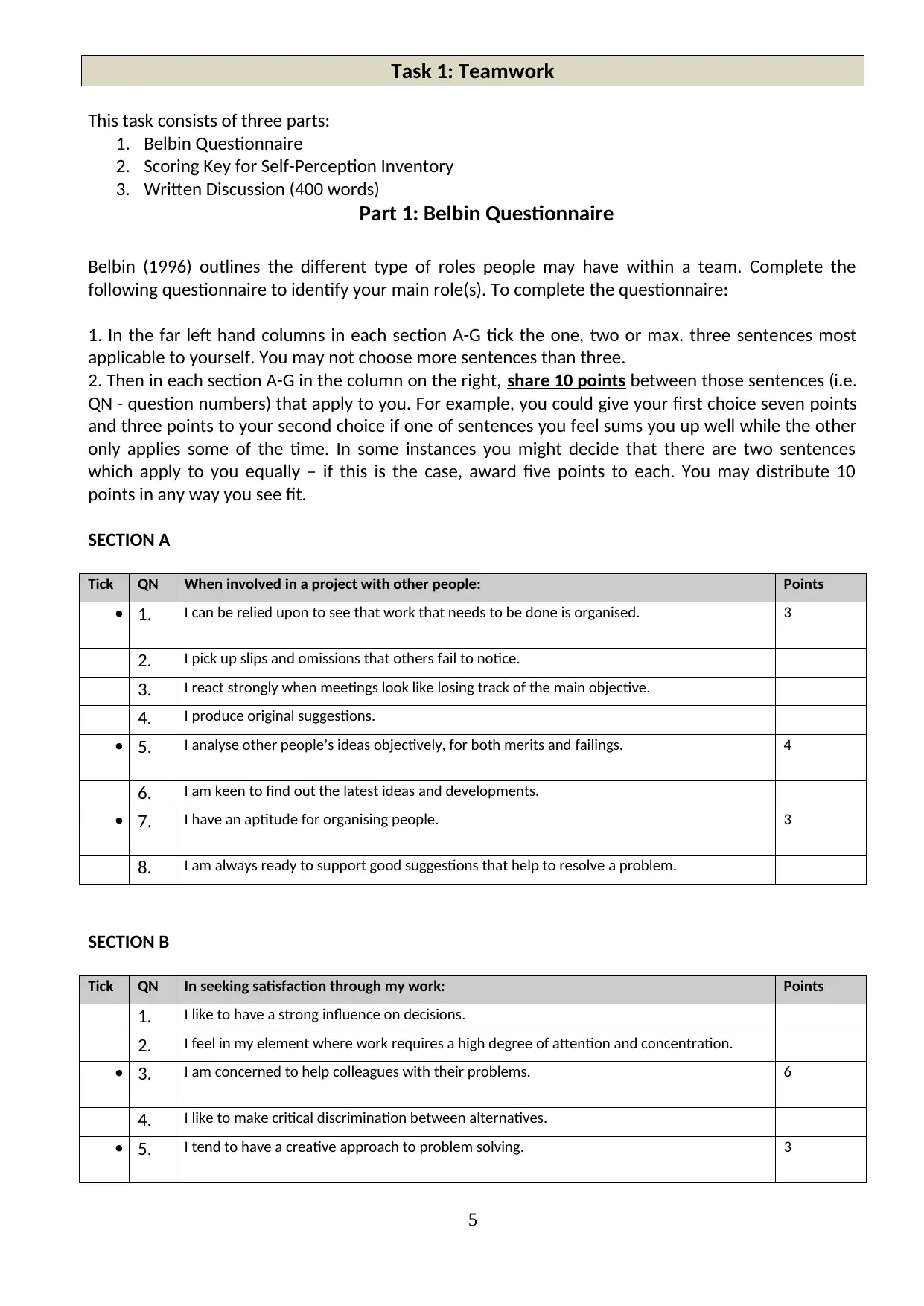
Task 1: Teamwork
This task consists of three parts:
1. Belbin Questionnaire
2. Scoring Key for Self-Perception Inventory
3. Written Discussion (400 words)
Part 1: Belbin Questionnaire
Belbin (1996) outlines the different type of roles people may have within a team. Complete the
following questionnaire to identify your main role(s). To complete the questionnaire:
1. In the far left hand columns in each section A-G tick the one, two or max. three sentences most
applicable to yourself. You may not choose more sentences than three.
2. Then in each section A-G in the column on the right, share 10 points between those sentences (i.e.
QN - question numbers) that apply to you. For example, you could give your first choice seven points
and three points to your second choice if one of sentences you feel sums you up well while the other
only applies some of the time. In some instances you might decide that there are two sentences
which apply to you equally – if this is the case, award five points to each. You may distribute 10
points in any way you see fit.
SECTION A
Tick QN When involved in a project with other people: Points
1. I can be relied upon to see that work that needs to be done is organised. 3
2. I pick up slips and omissions that others fail to notice.
3. I react strongly when meetings look like losing track of the main objective.
4. I produce original suggestions.
5. I analyse other people’s ideas objectively, for both merits and failings. 4
6. I am keen to find out the latest ideas and developments.
7. I have an aptitude for organising people. 3
8. I am always ready to support good suggestions that help to resolve a problem.
SECTION B
Tick QN In seeking satisfaction through my work: Points
1. I like to have a strong influence on decisions.
2. I feel in my element where work requires a high degree of attention and concentration.
3. I am concerned to help colleagues with their problems. 6
4. I like to make critical discrimination between alternatives.
5. I tend to have a creative approach to problem solving. 3
5
This task consists of three parts:
1. Belbin Questionnaire
2. Scoring Key for Self-Perception Inventory
3. Written Discussion (400 words)
Part 1: Belbin Questionnaire
Belbin (1996) outlines the different type of roles people may have within a team. Complete the
following questionnaire to identify your main role(s). To complete the questionnaire:
1. In the far left hand columns in each section A-G tick the one, two or max. three sentences most
applicable to yourself. You may not choose more sentences than three.
2. Then in each section A-G in the column on the right, share 10 points between those sentences (i.e.
QN - question numbers) that apply to you. For example, you could give your first choice seven points
and three points to your second choice if one of sentences you feel sums you up well while the other
only applies some of the time. In some instances you might decide that there are two sentences
which apply to you equally – if this is the case, award five points to each. You may distribute 10
points in any way you see fit.
SECTION A
Tick QN When involved in a project with other people: Points
1. I can be relied upon to see that work that needs to be done is organised. 3
2. I pick up slips and omissions that others fail to notice.
3. I react strongly when meetings look like losing track of the main objective.
4. I produce original suggestions.
5. I analyse other people’s ideas objectively, for both merits and failings. 4
6. I am keen to find out the latest ideas and developments.
7. I have an aptitude for organising people. 3
8. I am always ready to support good suggestions that help to resolve a problem.
SECTION B
Tick QN In seeking satisfaction through my work: Points
1. I like to have a strong influence on decisions.
2. I feel in my element where work requires a high degree of attention and concentration.
3. I am concerned to help colleagues with their problems. 6
4. I like to make critical discrimination between alternatives.
5. I tend to have a creative approach to problem solving. 3
5
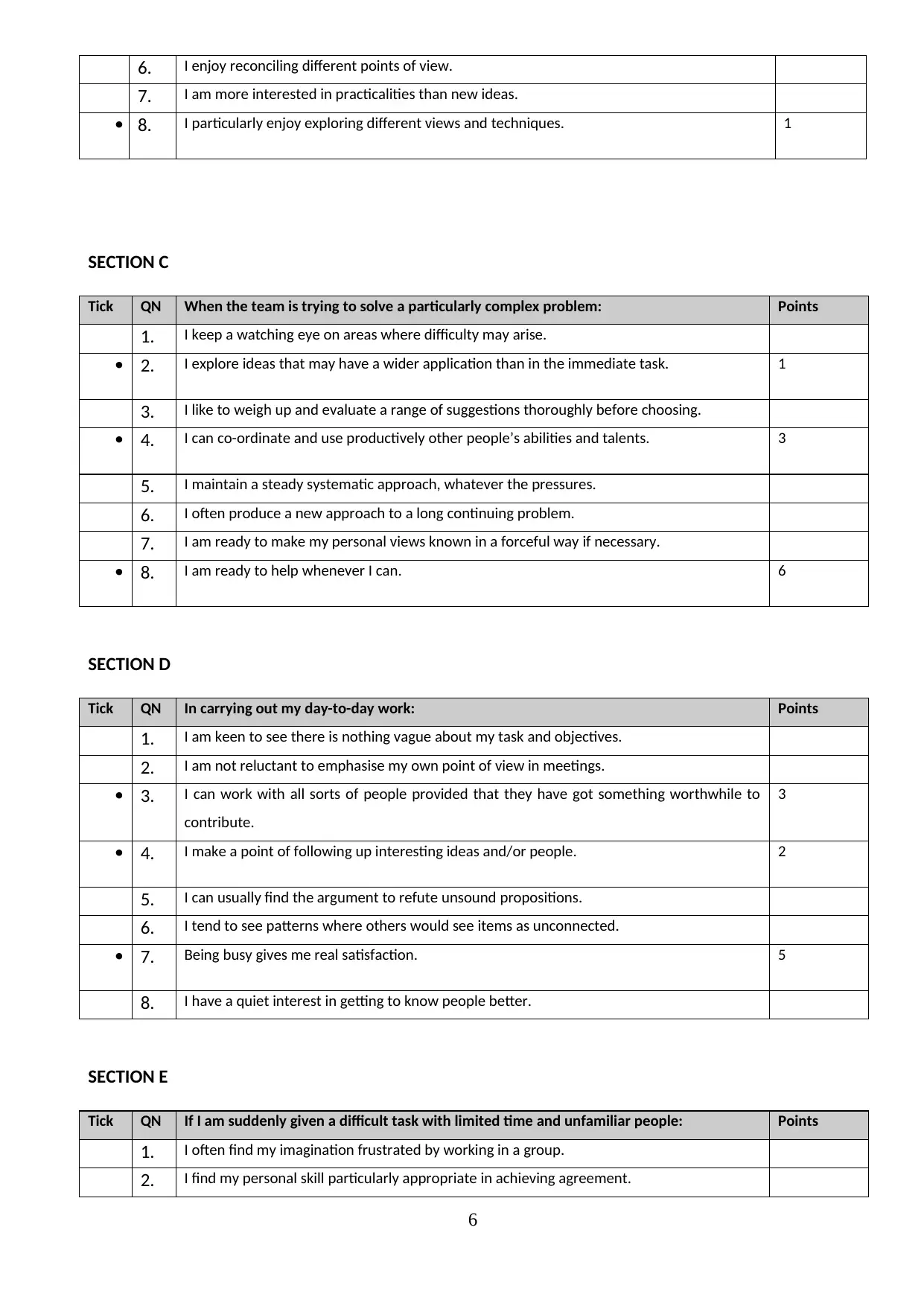
6. I enjoy reconciling different points of view.
7. I am more interested in practicalities than new ideas.
8. I particularly enjoy exploring different views and techniques. 1
SECTION C
Tick QN When the team is trying to solve a particularly complex problem: Points
1. I keep a watching eye on areas where difficulty may arise.
2. I explore ideas that may have a wider application than in the immediate task. 1
3. I like to weigh up and evaluate a range of suggestions thoroughly before choosing.
4. I can co-ordinate and use productively other people’s abilities and talents. 3
5. I maintain a steady systematic approach, whatever the pressures.
6. I often produce a new approach to a long continuing problem.
7. I am ready to make my personal views known in a forceful way if necessary.
8. I am ready to help whenever I can. 6
SECTION D
Tick QN In carrying out my day-to-day work: Points
1. I am keen to see there is nothing vague about my task and objectives.
2. I am not reluctant to emphasise my own point of view in meetings.
3. I can work with all sorts of people provided that they have got something worthwhile to
contribute.
3
4. I make a point of following up interesting ideas and/or people. 2
5. I can usually find the argument to refute unsound propositions.
6. I tend to see patterns where others would see items as unconnected.
7. Being busy gives me real satisfaction. 5
8. I have a quiet interest in getting to know people better.
SECTION E
Tick QN If I am suddenly given a difficult task with limited time and unfamiliar people: Points
1. I often find my imagination frustrated by working in a group.
2. I find my personal skill particularly appropriate in achieving agreement.
6
7. I am more interested in practicalities than new ideas.
8. I particularly enjoy exploring different views and techniques. 1
SECTION C
Tick QN When the team is trying to solve a particularly complex problem: Points
1. I keep a watching eye on areas where difficulty may arise.
2. I explore ideas that may have a wider application than in the immediate task. 1
3. I like to weigh up and evaluate a range of suggestions thoroughly before choosing.
4. I can co-ordinate and use productively other people’s abilities and talents. 3
5. I maintain a steady systematic approach, whatever the pressures.
6. I often produce a new approach to a long continuing problem.
7. I am ready to make my personal views known in a forceful way if necessary.
8. I am ready to help whenever I can. 6
SECTION D
Tick QN In carrying out my day-to-day work: Points
1. I am keen to see there is nothing vague about my task and objectives.
2. I am not reluctant to emphasise my own point of view in meetings.
3. I can work with all sorts of people provided that they have got something worthwhile to
contribute.
3
4. I make a point of following up interesting ideas and/or people. 2
5. I can usually find the argument to refute unsound propositions.
6. I tend to see patterns where others would see items as unconnected.
7. Being busy gives me real satisfaction. 5
8. I have a quiet interest in getting to know people better.
SECTION E
Tick QN If I am suddenly given a difficult task with limited time and unfamiliar people: Points
1. I often find my imagination frustrated by working in a group.
2. I find my personal skill particularly appropriate in achieving agreement.
6
⊘ This is a preview!⊘
Do you want full access?
Subscribe today to unlock all pages.

Trusted by 1+ million students worldwide
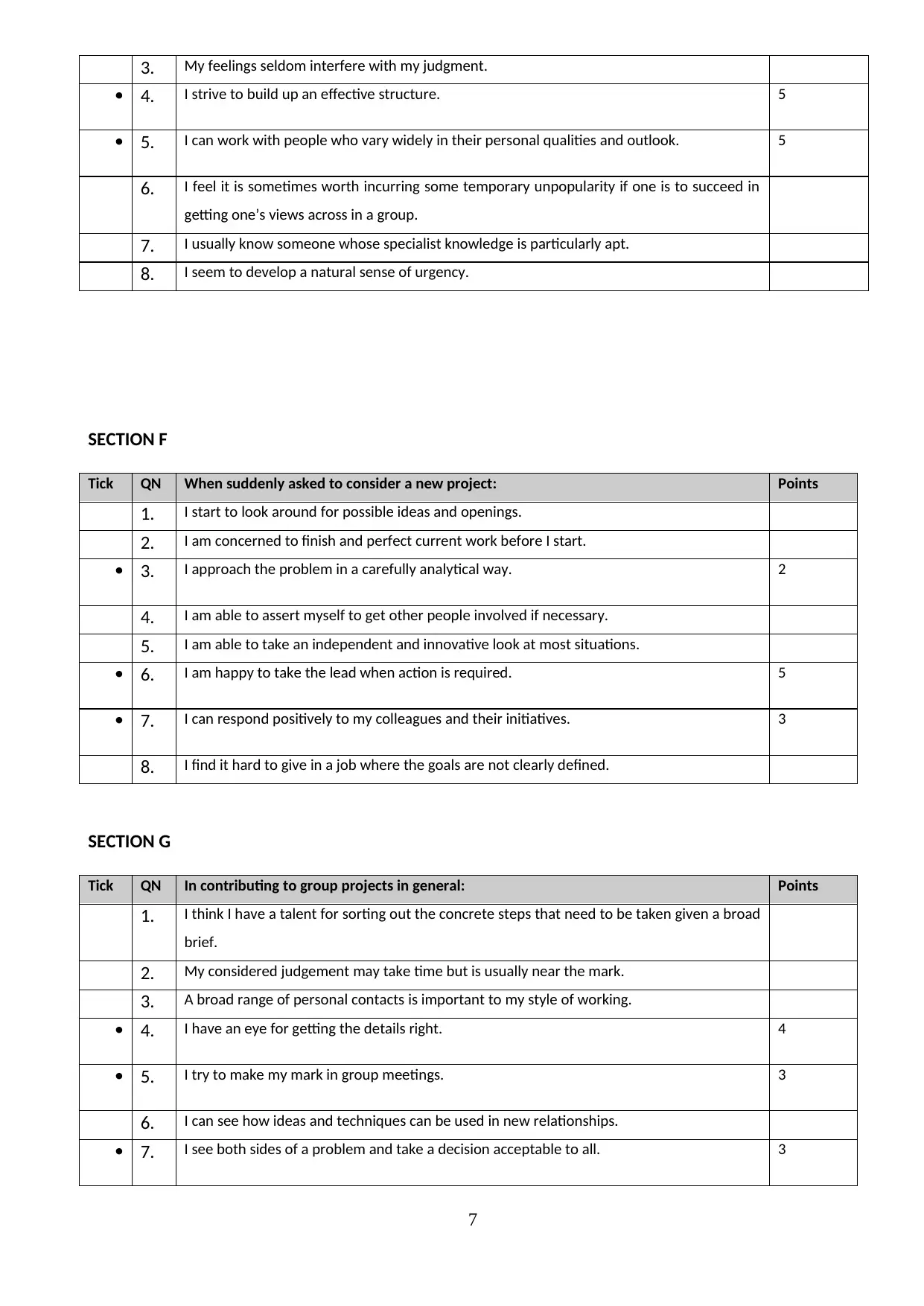
3. My feelings seldom interfere with my judgment.
4. I strive to build up an effective structure. 5
5. I can work with people who vary widely in their personal qualities and outlook. 5
6. I feel it is sometimes worth incurring some temporary unpopularity if one is to succeed in
getting one’s views across in a group.
7. I usually know someone whose specialist knowledge is particularly apt.
8. I seem to develop a natural sense of urgency.
SECTION F
Tick QN When suddenly asked to consider a new project: Points
1. I start to look around for possible ideas and openings.
2. I am concerned to finish and perfect current work before I start.
3. I approach the problem in a carefully analytical way. 2
4. I am able to assert myself to get other people involved if necessary.
5. I am able to take an independent and innovative look at most situations.
6. I am happy to take the lead when action is required. 5
7. I can respond positively to my colleagues and their initiatives. 3
8. I find it hard to give in a job where the goals are not clearly defined.
SECTION G
Tick QN In contributing to group projects in general: Points
1. I think I have a talent for sorting out the concrete steps that need to be taken given a broad
brief.
2. My considered judgement may take time but is usually near the mark.
3. A broad range of personal contacts is important to my style of working.
4. I have an eye for getting the details right. 4
5. I try to make my mark in group meetings. 3
6. I can see how ideas and techniques can be used in new relationships.
7. I see both sides of a problem and take a decision acceptable to all. 3
7
4. I strive to build up an effective structure. 5
5. I can work with people who vary widely in their personal qualities and outlook. 5
6. I feel it is sometimes worth incurring some temporary unpopularity if one is to succeed in
getting one’s views across in a group.
7. I usually know someone whose specialist knowledge is particularly apt.
8. I seem to develop a natural sense of urgency.
SECTION F
Tick QN When suddenly asked to consider a new project: Points
1. I start to look around for possible ideas and openings.
2. I am concerned to finish and perfect current work before I start.
3. I approach the problem in a carefully analytical way. 2
4. I am able to assert myself to get other people involved if necessary.
5. I am able to take an independent and innovative look at most situations.
6. I am happy to take the lead when action is required. 5
7. I can respond positively to my colleagues and their initiatives. 3
8. I find it hard to give in a job where the goals are not clearly defined.
SECTION G
Tick QN In contributing to group projects in general: Points
1. I think I have a talent for sorting out the concrete steps that need to be taken given a broad
brief.
2. My considered judgement may take time but is usually near the mark.
3. A broad range of personal contacts is important to my style of working.
4. I have an eye for getting the details right. 4
5. I try to make my mark in group meetings. 3
6. I can see how ideas and techniques can be used in new relationships.
7. I see both sides of a problem and take a decision acceptable to all. 3
7
Paraphrase This Document
Need a fresh take? Get an instant paraphrase of this document with our AI Paraphraser
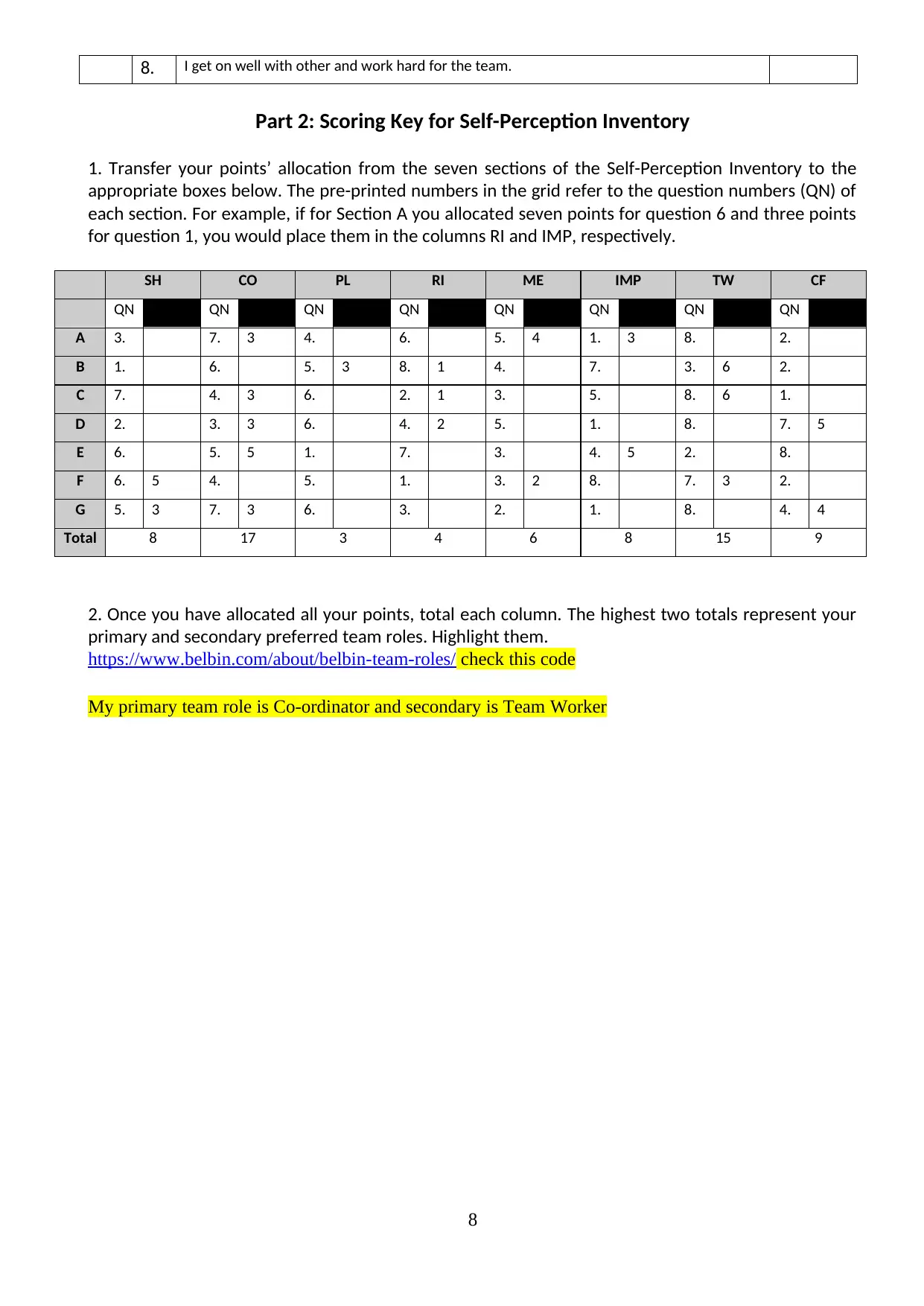
8. I get on well with other and work hard for the team.
Part 2: Scoring Key for Self-Perception Inventory
1. Transfer your points’ allocation from the seven sections of the Self-Perception Inventory to the
appropriate boxes below. The pre-printed numbers in the grid refer to the question numbers (QN) of
each section. For example, if for Section A you allocated seven points for question 6 and three points
for question 1, you would place them in the columns RI and IMP, respectively.
SH CO PL RI ME IMP TW CF
QN Points QN Points QN Points QN Points QN Points QN Points QN Points QN Points
A 3. 7. 3 4. 6. 5. 4 1. 3 8. 2.
B 1. 6. 5. 3 8. 1 4. 7. 3. 6 2.
C 7. 4. 3 6. 2. 1 3. 5. 8. 6 1.
D 2. 3. 3 6. 4. 2 5. 1. 8. 7. 5
E 6. 5. 5 1. 7. 3. 4. 5 2. 8.
F 6. 5 4. 5. 1. 3. 2 8. 7. 3 2.
G 5. 3 7. 3 6. 3. 2. 1. 8. 4. 4
Total 8 17 3 4 6 8 15 9
2. Once you have allocated all your points, total each column. The highest two totals represent your
primary and secondary preferred team roles. Highlight them.
https://www.belbin.com/about/belbin-team-roles/ check this code
My primary team role is Co-ordinator and secondary is Team Worker
8
Part 2: Scoring Key for Self-Perception Inventory
1. Transfer your points’ allocation from the seven sections of the Self-Perception Inventory to the
appropriate boxes below. The pre-printed numbers in the grid refer to the question numbers (QN) of
each section. For example, if for Section A you allocated seven points for question 6 and three points
for question 1, you would place them in the columns RI and IMP, respectively.
SH CO PL RI ME IMP TW CF
QN Points QN Points QN Points QN Points QN Points QN Points QN Points QN Points
A 3. 7. 3 4. 6. 5. 4 1. 3 8. 2.
B 1. 6. 5. 3 8. 1 4. 7. 3. 6 2.
C 7. 4. 3 6. 2. 1 3. 5. 8. 6 1.
D 2. 3. 3 6. 4. 2 5. 1. 8. 7. 5
E 6. 5. 5 1. 7. 3. 4. 5 2. 8.
F 6. 5 4. 5. 1. 3. 2 8. 7. 3 2.
G 5. 3 7. 3 6. 3. 2. 1. 8. 4. 4
Total 8 17 3 4 6 8 15 9
2. Once you have allocated all your points, total each column. The highest two totals represent your
primary and secondary preferred team roles. Highlight them.
https://www.belbin.com/about/belbin-team-roles/ check this code
My primary team role is Co-ordinator and secondary is Team Worker
8
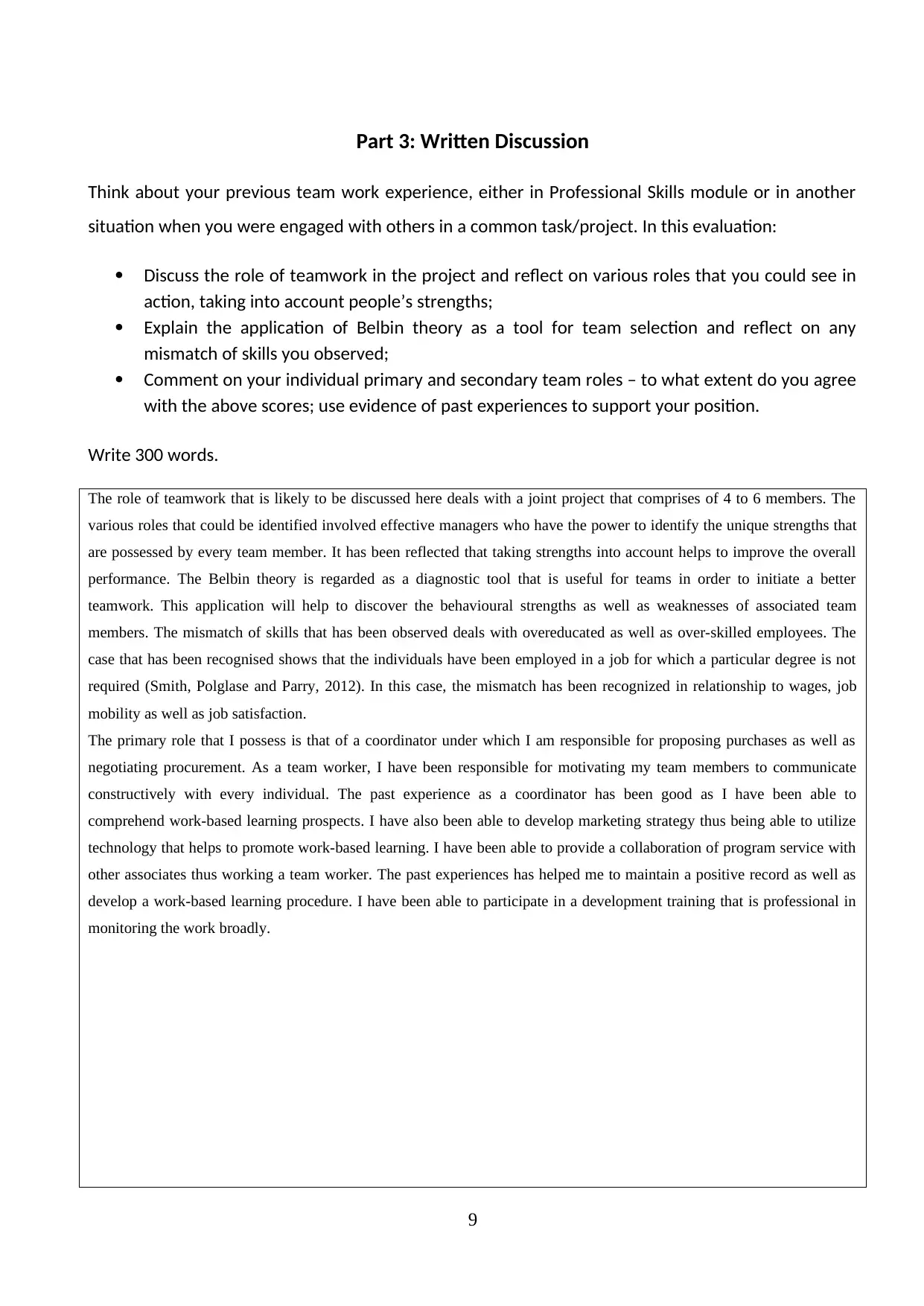
Part 3: Written Discussion
Think about your previous team work experience, either in Professional Skills module or in another
situation when you were engaged with others in a common task/project. In this evaluation:
Discuss the role of teamwork in the project and reflect on various roles that you could see in
action, taking into account people’s strengths;
Explain the application of Belbin theory as a tool for team selection and reflect on any
mismatch of skills you observed;
Comment on your individual primary and secondary team roles – to what extent do you agree
with the above scores; use evidence of past experiences to support your position.
Write 300 words.
The role of teamwork that is likely to be discussed here deals with a joint project that comprises of 4 to 6 members. The
various roles that could be identified involved effective managers who have the power to identify the unique strengths that
are possessed by every team member. It has been reflected that taking strengths into account helps to improve the overall
performance. The Belbin theory is regarded as a diagnostic tool that is useful for teams in order to initiate a better
teamwork. This application will help to discover the behavioural strengths as well as weaknesses of associated team
members. The mismatch of skills that has been observed deals with overeducated as well as over-skilled employees. The
case that has been recognised shows that the individuals have been employed in a job for which a particular degree is not
required (Smith, Polglase and Parry, 2012). In this case, the mismatch has been recognized in relationship to wages, job
mobility as well as job satisfaction.
The primary role that I possess is that of a coordinator under which I am responsible for proposing purchases as well as
negotiating procurement. As a team worker, I have been responsible for motivating my team members to communicate
constructively with every individual. The past experience as a coordinator has been good as I have been able to
comprehend work-based learning prospects. I have also been able to develop marketing strategy thus being able to utilize
technology that helps to promote work-based learning. I have been able to provide a collaboration of program service with
other associates thus working a team worker. The past experiences has helped me to maintain a positive record as well as
develop a work-based learning procedure. I have been able to participate in a development training that is professional in
monitoring the work broadly.
9
Think about your previous team work experience, either in Professional Skills module or in another
situation when you were engaged with others in a common task/project. In this evaluation:
Discuss the role of teamwork in the project and reflect on various roles that you could see in
action, taking into account people’s strengths;
Explain the application of Belbin theory as a tool for team selection and reflect on any
mismatch of skills you observed;
Comment on your individual primary and secondary team roles – to what extent do you agree
with the above scores; use evidence of past experiences to support your position.
Write 300 words.
The role of teamwork that is likely to be discussed here deals with a joint project that comprises of 4 to 6 members. The
various roles that could be identified involved effective managers who have the power to identify the unique strengths that
are possessed by every team member. It has been reflected that taking strengths into account helps to improve the overall
performance. The Belbin theory is regarded as a diagnostic tool that is useful for teams in order to initiate a better
teamwork. This application will help to discover the behavioural strengths as well as weaknesses of associated team
members. The mismatch of skills that has been observed deals with overeducated as well as over-skilled employees. The
case that has been recognised shows that the individuals have been employed in a job for which a particular degree is not
required (Smith, Polglase and Parry, 2012). In this case, the mismatch has been recognized in relationship to wages, job
mobility as well as job satisfaction.
The primary role that I possess is that of a coordinator under which I am responsible for proposing purchases as well as
negotiating procurement. As a team worker, I have been responsible for motivating my team members to communicate
constructively with every individual. The past experience as a coordinator has been good as I have been able to
comprehend work-based learning prospects. I have also been able to develop marketing strategy thus being able to utilize
technology that helps to promote work-based learning. I have been able to provide a collaboration of program service with
other associates thus working a team worker. The past experiences has helped me to maintain a positive record as well as
develop a work-based learning procedure. I have been able to participate in a development training that is professional in
monitoring the work broadly.
9
⊘ This is a preview!⊘
Do you want full access?
Subscribe today to unlock all pages.

Trusted by 1+ million students worldwide
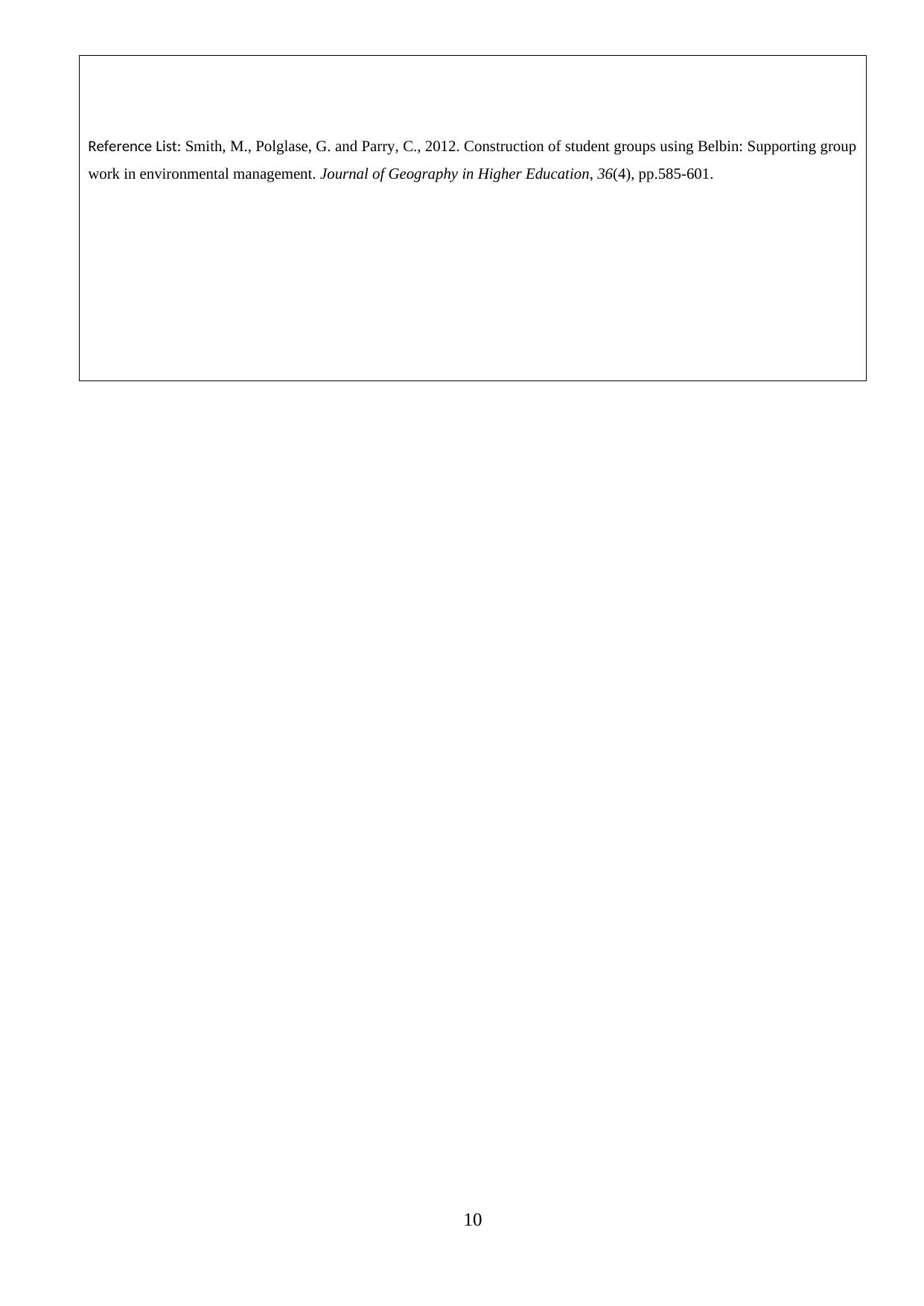
Reference List: Smith, M., Polglase, G. and Parry, C., 2012. Construction of student groups using Belbin: Supporting group
work in environmental management. Journal of Geography in Higher Education, 36(4), pp.585-601.
10
work in environmental management. Journal of Geography in Higher Education, 36(4), pp.585-601.
10
Paraphrase This Document
Need a fresh take? Get an instant paraphrase of this document with our AI Paraphraser
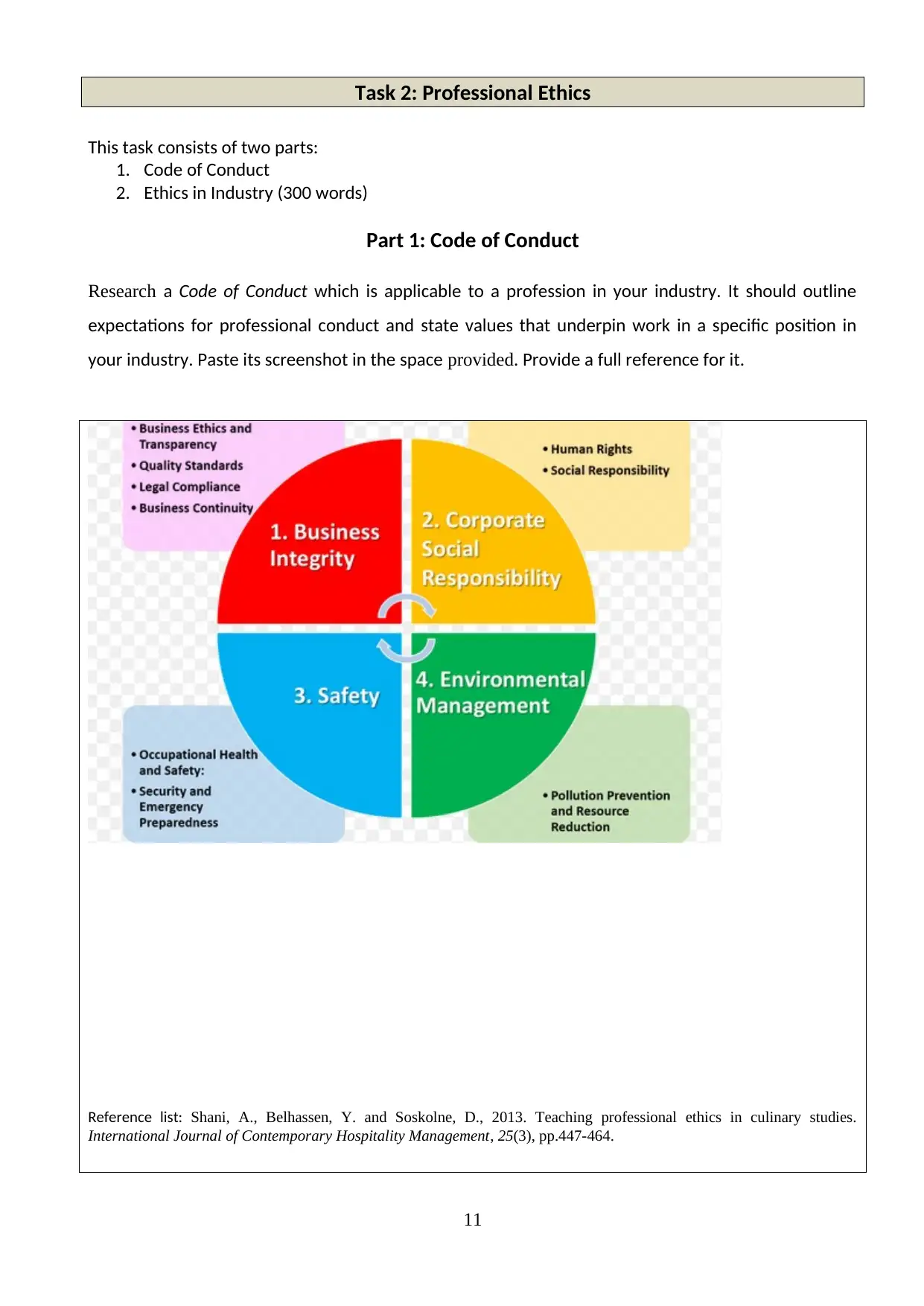
Task 2: Professional Ethics
This task consists of two parts:
1. Code of Conduct
2. Ethics in Industry (300 words)
Part 1: Code of Conduct
Research a Code of Conduct which is applicable to a profession in your industry. It should outline
expectations for professional conduct and state values that underpin work in a specific position in
your industry. Paste its screenshot in the space provided. Provide a full reference for it.
Reference list: Shani, A., Belhassen, Y. and Soskolne, D., 2013. Teaching professional ethics in culinary studies.
International Journal of Contemporary Hospitality Management, 25(3), pp.447-464.
11
This task consists of two parts:
1. Code of Conduct
2. Ethics in Industry (300 words)
Part 1: Code of Conduct
Research a Code of Conduct which is applicable to a profession in your industry. It should outline
expectations for professional conduct and state values that underpin work in a specific position in
your industry. Paste its screenshot in the space provided. Provide a full reference for it.
Reference list: Shani, A., Belhassen, Y. and Soskolne, D., 2013. Teaching professional ethics in culinary studies.
International Journal of Contemporary Hospitality Management, 25(3), pp.447-464.
11

12
⊘ This is a preview!⊘
Do you want full access?
Subscribe today to unlock all pages.

Trusted by 1+ million students worldwide
1 out of 21
Related Documents
Your All-in-One AI-Powered Toolkit for Academic Success.
+13062052269
info@desklib.com
Available 24*7 on WhatsApp / Email
![[object Object]](/_next/static/media/star-bottom.7253800d.svg)
Unlock your academic potential
Copyright © 2020–2026 A2Z Services. All Rights Reserved. Developed and managed by ZUCOL.





